Can you picture yourself cruising down Highway 1 or along Nevada’s “Loneliest Road” with all of your buddies? Here’s how to rent an RV to make that happen.
How to Rent an RV: What You Need to Know Before Renting a Campervan
Your buddy is at the wheel—after you figured out how to rent an RV, you decide that he’s got the best driving track record of your crew. Your copilot is on music duty; he’s been working on a nostalgia-inducing playlist for weeks, and it’s taking you back to college.
You’re in the back with the rest of ’em singing all the wrong lyrics and then a synchronous “My Sharona!” while playing another round of Rummy.
You’re a few days into your cross-country road trip, cruising along Route 50 in the spiffed-up RV you rented. Sure, food and accommodation are few and far between—but you’ve got a fully equipped kitchen, comfortable beds and your preferred company right there with you.
Can you picture it? Of course, it’s easier to imagine this kind of trip of a lifetime if you knew what in the world you were doing when it comes to renting an RV.
What Is an RV?
First and foremost, an RV is a recreational vehicle that’s, in short, a motorized home designed to accommodate you while getting you from Point A to Point B.
What’s the Difference Between an RV and a Campervan?
When renters refer to RVs, they’re usually talking about either a motor vehicle or a trailer, both of which are usually equipped with home amenities like a living space, a bedroom and a kitchen.
What commonly comes to mind is a motorhome, which is large and compartmentalized — essentially meant to be, well, a home with a motor. It’s meant to provide comfort and, perhaps, a touch of luxury while traveling the great outdoors.
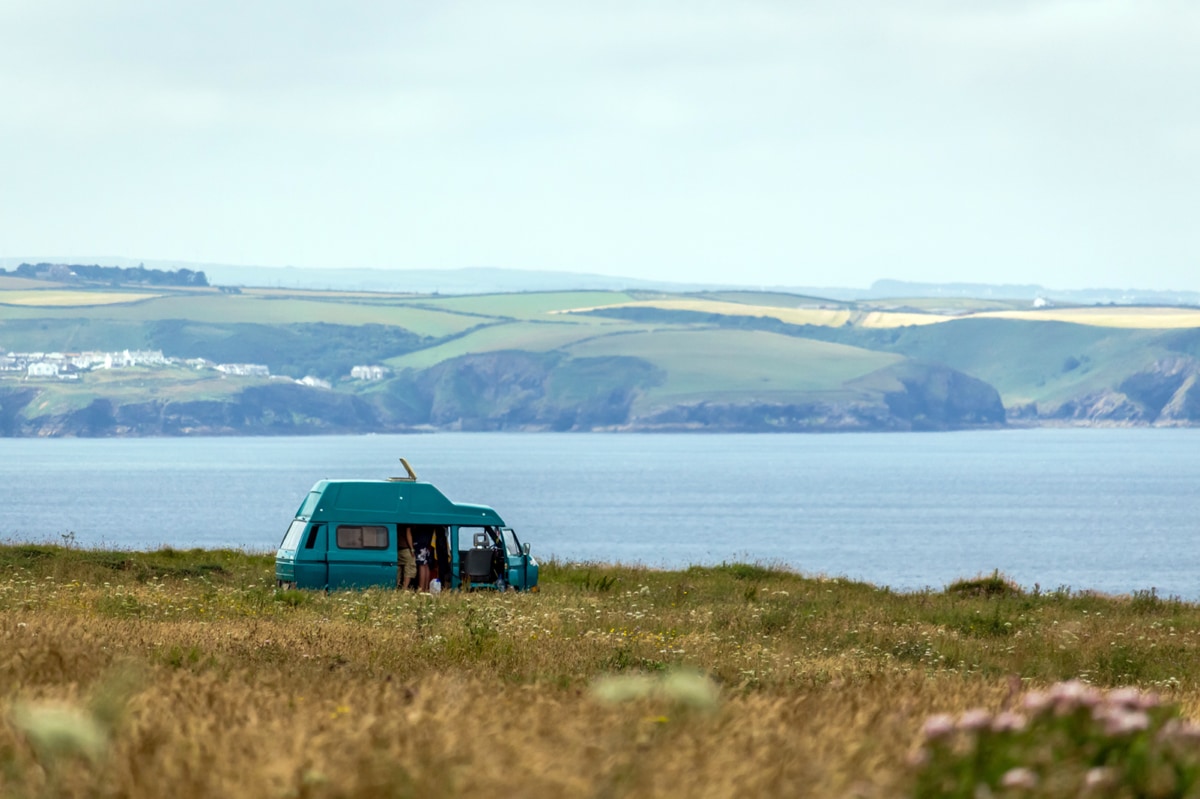
When renters refer to campervans, however, they’re talking about a van that’s been “fitted out” with basic accommodations—a van in which you can sleep and prepare food. They’re much smaller than typical RVs with beds of some kind, small cooktops and, sometimes, bathroom facilities.
Because of their small size (which means better gas mileage and easier maneuverability), campervan enthusiasts are typically young, free-spirited, backpacking-type travelers.
There are several types of RVs for different types of road trippers, travel plans and budgets.
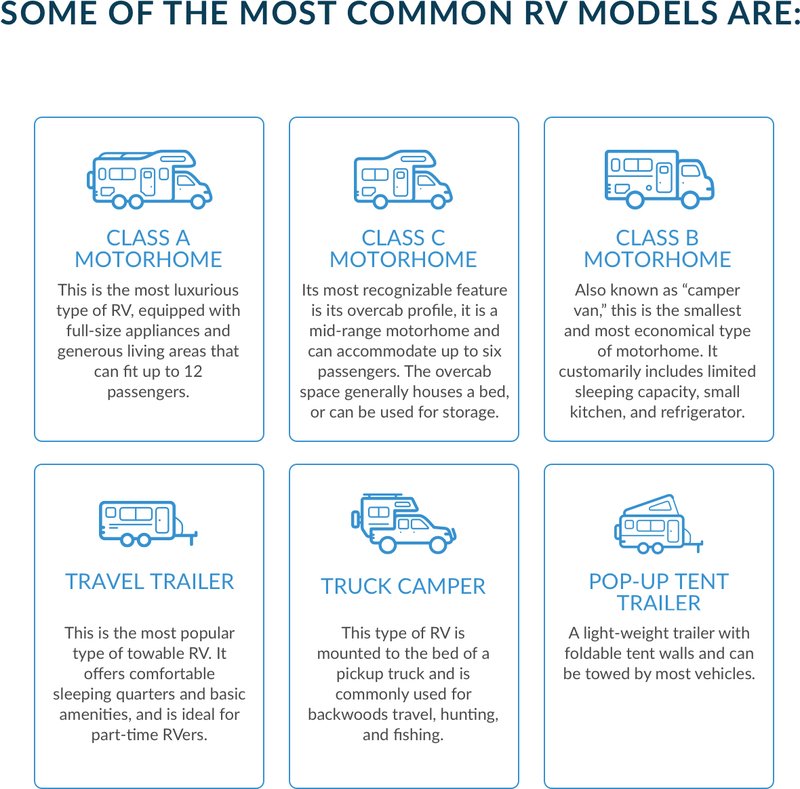
Class A Diesel or Gas Motorhome
These are your crème de la crème motorhomes—they are the largest and most luxurious form of RV. Class As typically have full-sized furniture and kitchens, entertainment systems and sometimes a washer and dryer unit. In some models, they can sleep up to 12 people.
The only difference between a Class A Diesel Motorhome and a Class A Gas Motorhome is that the former are much more fuel-efficient. Keep in mind that, regardless, they are both the most expensive options to rent, have low gas mileage and take more skill to drive because of their size.
Class B Motorhome
If you’re an adventurous and smaller group, a Class B Motorhome RV is an excellent choice. It looks a lot like a regular van from the outside, but it’s still equipped with home amenities inside.
The Class B Motorhome is tall enough to stand inside and has a kitchenette with a water tank, a double bed for two, and a small space for a combined shower and toilet.
They drive more like cars (which means easier parking and maneuverability, and they get better gas mileage than your Class A Motorhomes.
Class C Motorhome
A Class C Motorhome is a good middle ground between a Class A and a Class B. Typically between 20 and 30 feet long with a cab, Class C Motorhomes can accommodate up to five people.
They boast comfortable amenities like queen-sized beds, larger living areas and separate bathrooms. Like Class B Motorhomes, they also drive easier than Class As and get better gas mileage.
Travel Trailers
Travel trailers are perfect if you want to tow your living quarters behind you, and also be able to unhitch and use your vehicle like normal. There’s an extensive range of travel trailers, from small ones with bare-minimum amenities to fancy ones with all the bells and whistles. Sizes can range from 10 feet up to 40 feet.
Fifth Wheel
Considered a step up from travel trailers, a Fifth Wheel RV offers more space thanks to its split-level floor plan. They affix to the back of your truck or over the bed of your truck. And the extra cove added over the front of the truck means more living space for up two bathrooms and, sometimes, an outdoor kitchen extension.
You do need a pickup truck with high towing capacity for a Fifth Wheel, however.
Fold Downs or Expandables
Fold Downs—also known as camper trailers, pop-ups or tent trailers—are versatile, towable RVs that are ideal for beginners. They’re relatively lightweight, which makes them easy to tow, regardless of your vehicle type. And they vary in length, which makes some especially easy to maneuver.
You can often choose different amenity options depending on your needs, such as refrigerators, hot water, air conditioning and more.
Likewise, Expandables are designed for towing and are similar to Fold Downs with hard sides. They do have expandable tent ends, however. And they’re usually a step up from the Fold Down.
Toy Haulers
Toy Haulers are great if you’ve got a lot of toys—ATVs, motorcycles, snowmobiles, etc. That’s because they’re equipped with large cargo garages in the rears.
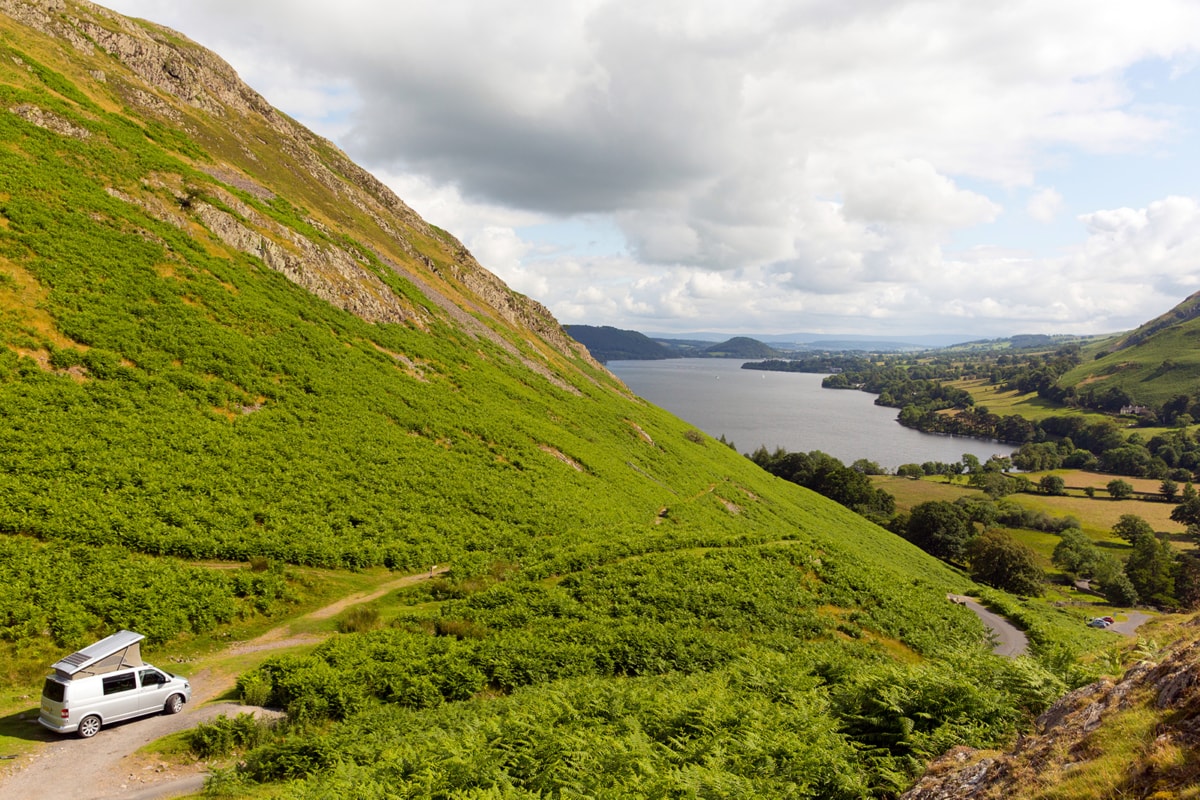
How to Rent an RV
Now that you know what an RV is (and the various options available), you’re probably ready to figure out how to rent an RV.
It might sound easy. You just call your friends over, all crowd around a laptop, Google RV rentals and pick one that looks like the most fun and affordable. Right?
Wrong. There are several key steps you should take to rent an RV to ensure that…
One of you can actually operate this RV.
There’s plenty of room for your road beers in the kitchen. (Yes, you can drink in an RV, so long as you’re not the driver!)
- The speaker setup is more than adequate.
- There are enough beds so you won’t be obliged to spoon.
- You’ll have ample living space for all the games of Charades.
- You can afford this road trip without having to sell your souls.
With that said, here’s how to rent an RV in three simple steps.
Decide on the Who, What, When, Where and How
Before you dive deep into the rental process, you’ll want to have the details of your trip down pat. Sit down to figure out who is going, what the purpose of your trip is, when you’re taking it, where you’re heading, and how you’re affording it.
Who
If you’re taking a bachelor or bachelorette party of eight, renting a camper van won’t even be an option. And if you’re headed to Coachella with just your partner, you probably don’t need the added luxuries and cost of a Class A Motorhome.
Also, consider your furry friends. If you plan on traveling with your adventure-loving dog, you have to make sure that your RV rental allows pets.
What
Once you’ve decided you who is going on this road trip, decide what you all want to get out of the trip. What’s the purpose?
As you now know, there are different amenities available with each option, so decide what feels necessary.
For example, if you are indeed road-tripping for weeks across the country, you’ll probably want space so you’re not on top of each other. If you anticipate long hours in remote nowhere lands, you’ll want a good enough kitchen for survival purposes.
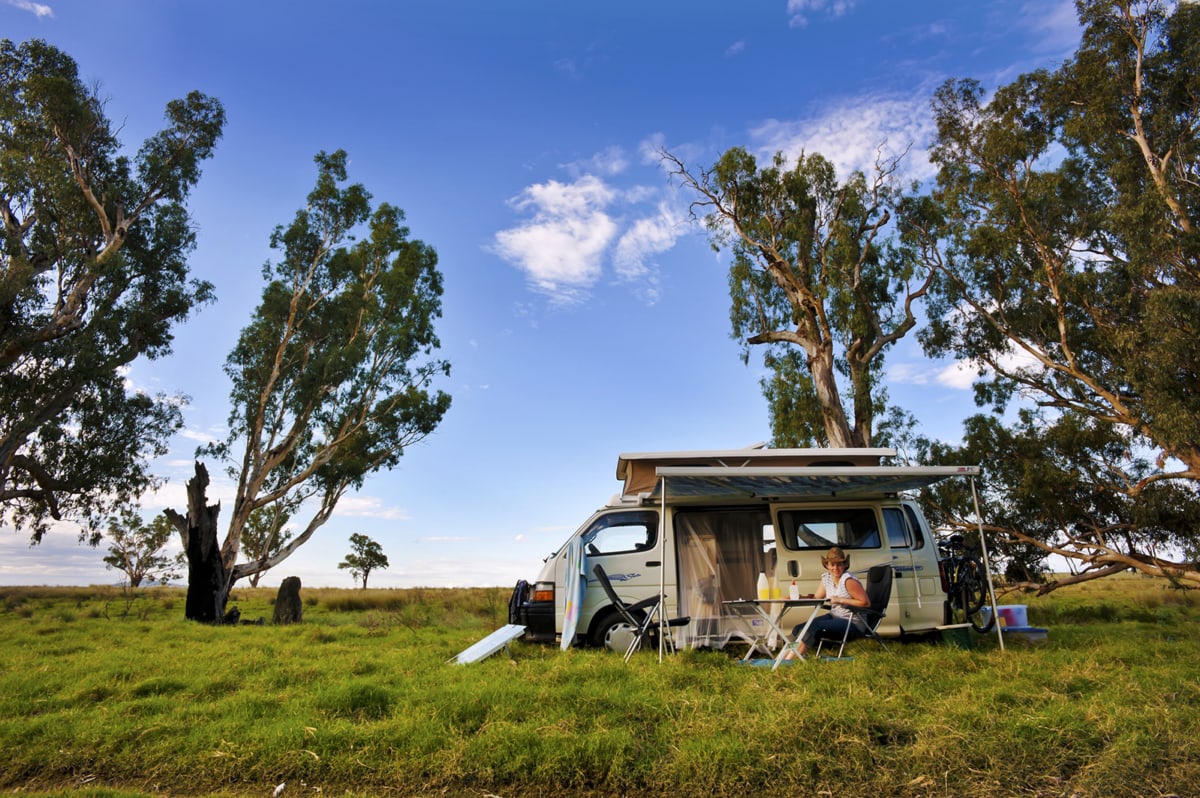
When
Now you know who’s coming and what you’re doing, so when are you leaving?
If you’re looking to hit the road in July or August, you should be booking your RV way ahead of time. During the high-season summer months, the availability of RVs (and the cost of RVs) can complicate plans.
Where
The difference between renting an RV in Denver and driving to Colorado versus driving to the Grand Canyon is substantial when it comes to rental period lengths, mileage needed, fuel efficiency, etc.
Consider where you’re going to help you narrow down RV options.
How
Figure out how you’re going to afford this road trip. Your budget will definitely affect your recreational vehicle rental options.
A larger RV, like the Class A Motorhome, will not only have a higher daily rate, but it will also guzzle more gas due to its lower fuel efficiency. Meanwhile, if you only take a Fold Down with limited amenities and plan to stay at campgrounds with bathrooms and such, you should take into account the cost per night to park yourself there.
Get Any Necessary Licensing
You or whoever you’re dubbing driver might need a license to drive an RV depending on where you live and the size of the RV you’re thinking about renting.
Some states will require you have non-commercial special licenses in order to drive an RV over a certain length or weight. Meanwhile, other states will require you to have a commercial driver’s license, which is needed for large and heavy vehicles (i.e. buses and tractor-trailers).
This guide is helpful in figuring out your state’s licensing requirements.
Book Through a Reputable Rental Owner or Company
Once you’ve worked out the logistics of your trip and narrowed down some RV types you’d be interested in renting, look for a reputable rental owner or company to book your RV.
You can always talk more with the RV owner or rental center to answer any questions you might have and, possibly, negotiate rates. So long as you’ve nailed exactly what you’re hoping to get out of your RV road trip and a general travel plan, they can certainly help make recommendations.
But how can you find a reputable rental company? There are several places to safely rent an RV.
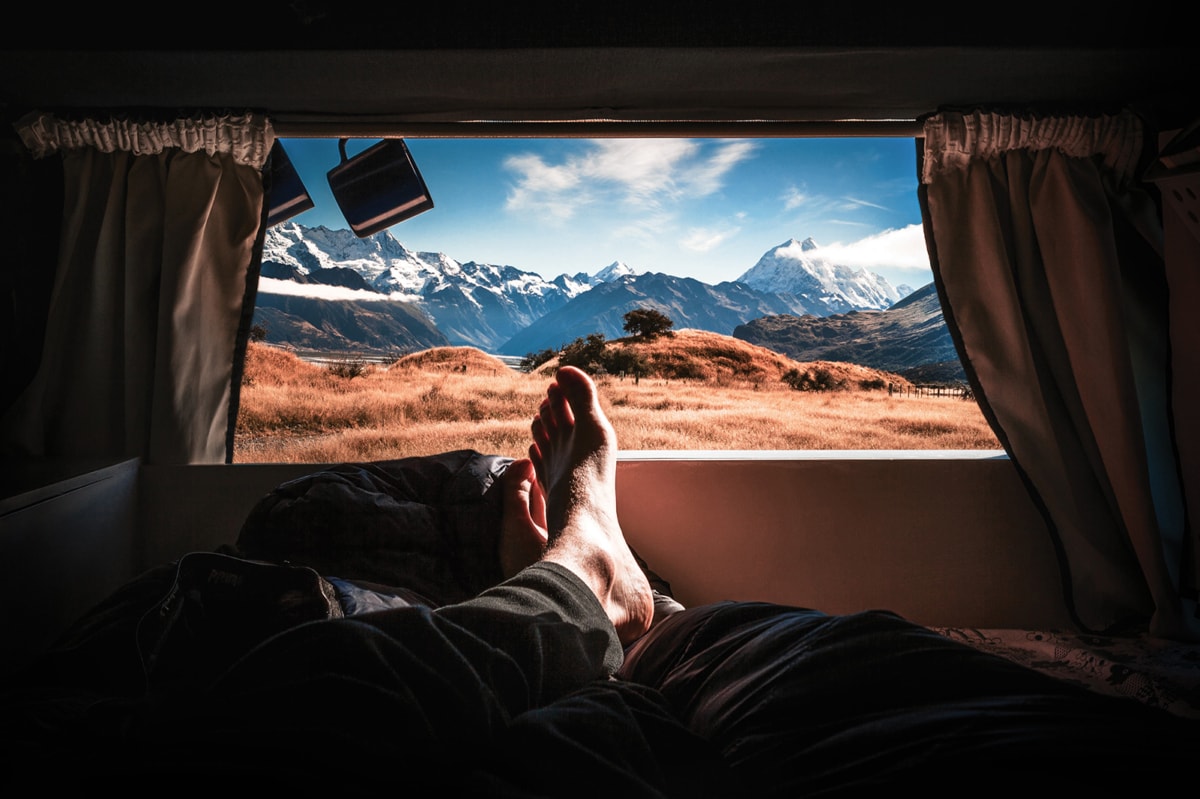
Where to Rent an RV?
You can rent RVs directly from owners, work with relocation rentals or rent via rental centers. Let’s dive into all three of your options and some of our favorite RV rental companies.
Renting an RV from an Owner
Owners, who have put a lot of love into their recreational vehicles and personalized them with often unexpected and cool amenities, will rent out their RVs for novices and regular road-trippers alike.
Through sites like Outdoorsy and RVshare, which are basically Airbnb for RVs, you can rent directly from RV owners.
Renting an RV is a big deal. It’s your home, transportation and refuge for however long you choose to travel with it. That’s why you’ll want to choose a reputable company that knows how to rent RVs the right, trustworthy way.
Outdoorsy is by far my favorite company to rent through, and you can read my full Outdoorsy review here.
They’re the second largest online RV rental company and has proven itself with its 5,000+ five-star reviews. We’re also impressed by the A+ rating Outdoorsy received from the Better Business Bureau after four years in business.
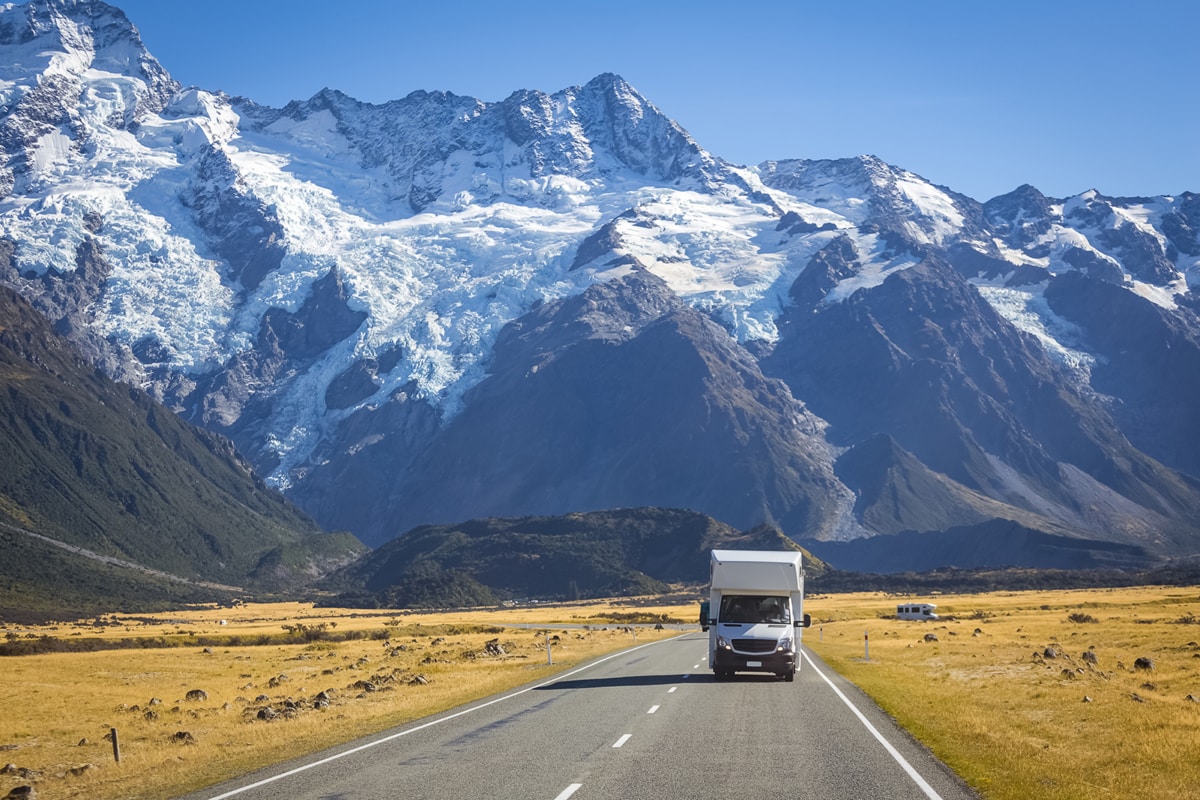
What we like best about Outdoorsy is that it’s easy to use and you can view renters’ profiles and reviews. Every renter has to pass an application, so you know you can trust who you’re dealing with. And you’ll have direct access to them so you can communicate any questions or concerns and make sure you’re making the right choice.
Plus, you can get insider advice on the RV from someone who knows that vehicle best, as well as important information like how much it usually costs to fill up the camper’s tank, if it comes with kitchen accessories, or other tips a seasoned RVer can offer about travel routes, rest stops, etc.
A few more reasons that make Outdoorsy our #1 recommendation:
- Up to $1 million insurance on approved bookings
- DMV checks on all drivers
- 24/7 rental roadside assistance
- A dedicated customer support team
- 93% average five-star reviews
All you have to do is search by dates and location. You can also filter your search by RV type, price (min/max), ratings and/or amenities.
Search for RVs in your area using the widget below:
Relocating RVs for a Company
Have you heard of a relocation rental? It’s okay if you haven’t because they’re not very well known. This is when companies pay you to relocate their vehicles to the destinations they need them to be.
If you’re flexible with your schedule and road trip accommodation needs, you can get some incredible deals. But RV relocation rentals usually don’t show up more than a week or so in advance, which can complicate travel planning.
You can find RVs to relocate through sites such as TransferCar and Imoova.
Renting an RV from a Rental Center
Lastly, of course, you have your larger companies that own a fleet of RVs that they rent out from rental centers, like Cruise America and USA RV Rental.
The range of RVs cost more to rent, but some people may feel more comfortable renting a vehicle in a more traditional way.
How Much Does it Cost to Rent an RV?
The cost of your RV rental varies significantly depending on the following:
- Your choice of RV
- Your dates and length of travel
- Where you choose to rent your RV
As mentioned above, the type of RV you choose will change the cost. Again, a Class A Motorhome is the most expensive option, while a Fold Down is your best bet for beginners on a budget.
Cost is also based on a daily rate, and you’ll want to know the rental owner or company’s mileage policy. Some may charge per mile traveled or allot a certain number of miles with an added fee if you go over (typically around $0.25-$0.75 per mile). They may also offer unlimited mileage, but be sure to ask so there are no surprises.
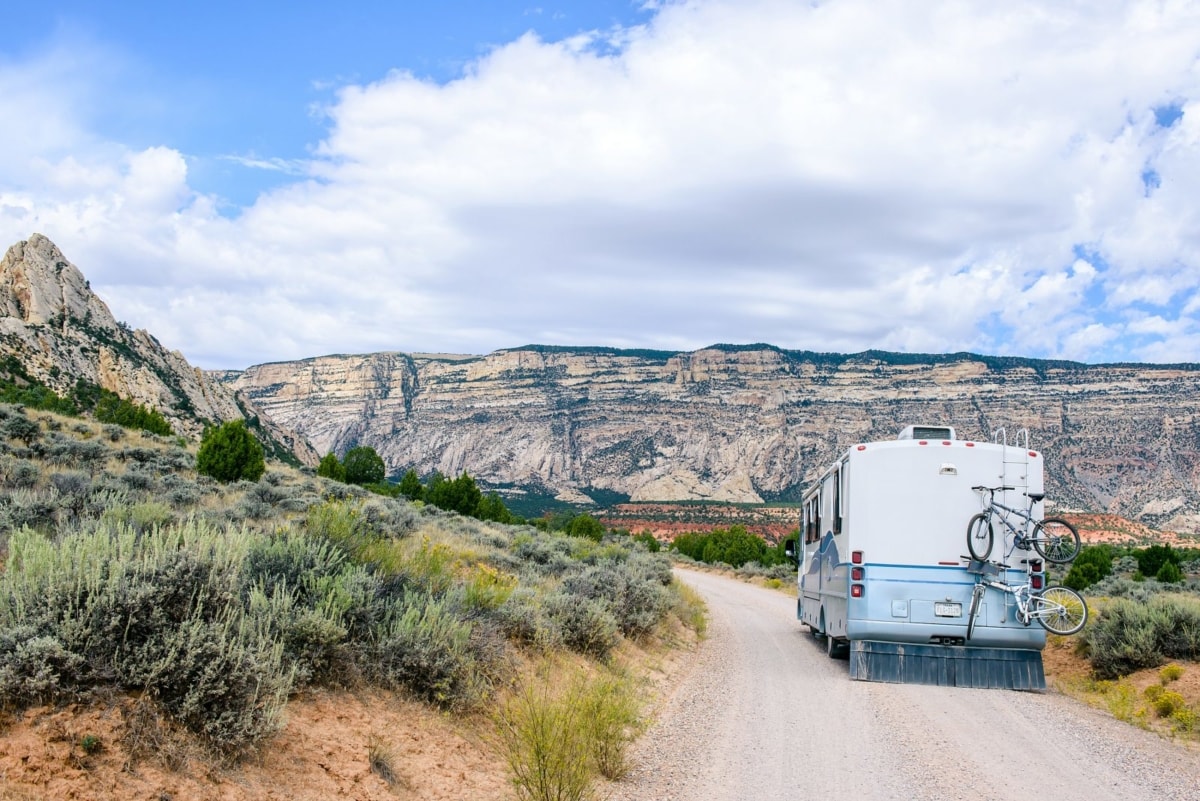
And, lastly, depending on from where you rent your RV, your cost can change. If you rent from an owner, there may be more wiggle room to negotiate rates. If you rent from a rental center with fixed rates, you’ll have to pay the advertised fee.
While there are a lot of different factors that will affect the cost to rent an RV, below is a general breakdown of average RV rental prices across the US. These prices are based on peer-to-peer RV rentals, like Outdoorsy. Rates from a traditional rental company will be higher.
| RV Type | Average Rental Price per Night |
| Class A | $175 to $275 |
| Class B | $75 to $200 |
| Class C | $150 to $200 |
| Travel Trailer | $50 to $125 |
| Fifth Wheel | $60 to $150 |
Added Expenses to Consider
And, as already mentioned, you should factor in the added expenses like the insurance costs, cleaning fees, mileage, gas, etc. into the total price.
As part of the RV rental process, you will have to put down a deposit. This may be a security deposit that gets refunded when the RV is returned unharmed (fingers crossed!) or a deposit that’s required upon booking to hold your reservation.
Also, insurance coverage is required. As with renting a car, rental companies may offer this coverage for an extra fee, or you can check your own car insurance to see if you’re covered.
Add cleaning fees to your list of possible incurred expenses, as well. They might charge you around $150 if you don’t return the RV clean. So get those cleaning gloves and mop ready if you want to save yourself some money.
Oh, and don’t forget gas! Most renters want you to return the RV with a full tank, or they’ll charge you what it costs to fill it up plus an extra fee. Gas costs can add up quickly, especially with those larger vehicles, so keep that fuel tank in mind.
How to Safely Drive an RV
Now that you know how to rent an RV, where you can go about renting one and how much it’ll cost you, you can go ahead and get yourself one. But once it’s in your hands, do you know how to drive an RV?
If you can’t tell by now, we’re all for renting an RV for a real adventure-filled experience. However, there are a few things we want to be sure you’re aware of to keep you safe on the road and comfortable on your journey.
First and foremost, driving a large RV, like a Class A Motorhome, is not like at all like driving a car. If you’re a complete newbie, you’ll want to practice like you did when preparing for your first driver’s test.
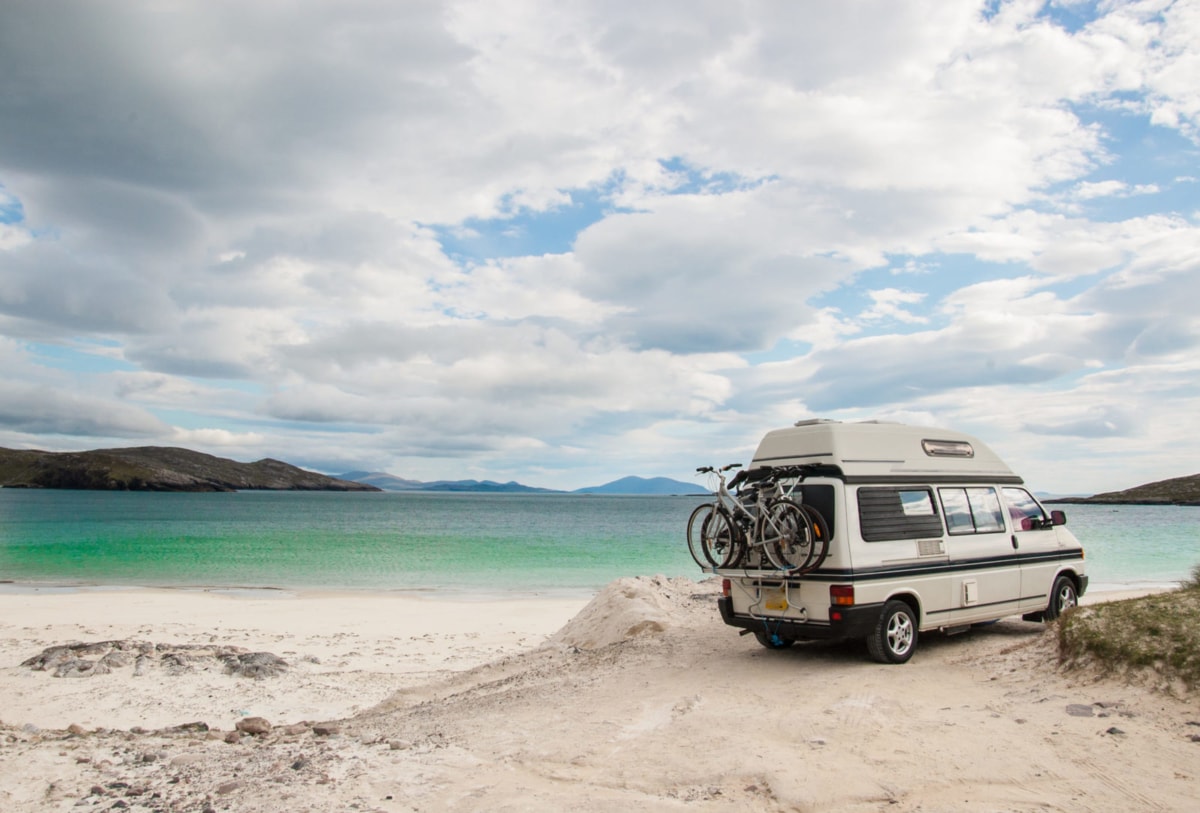
What you may not have considered is that RVs move around. Because they’re tall and heavy, wind or a gust of air will feel like it’s blowing you off course. But don’t panic; you can minimize this by traveling at a slower speed.
Slamming on your brakes or tailgating the car in front of you is a definite no-no with an RV. Again, because of their size and weight, you must allow plenty of time and distance to come to a complete stop safely. Keep your vehicle in low gear when going downhill.
One other consideration we’d like to bring to a novice RVer’s attention is knowing the size of your vehicle. On a cross country journey, you’re likely to come across many tunnels, overpasses and bridges. Be aware of bridge clearances because they’ll determine whether or not you can pass safely.
Take the Wheel
We encourage you to explore your options and find what’s best for you. Pump up your travel companions in the process.
Maybe this is your first RV road trip, but we have a feeling it won’t be your last.
READ MORE:
How to Rent an RV FAQs
-
How old do you have to be to rent an RV?
Age limits for renting an RV depend on the location and the policies of the company. Often, renters under 25 will have to pay an extra fee.
-
Do you need a license to rent an RV?
You definitely need a drivers license to rent an RV, but you don’t need a CDL or any special license.
-
Can you sleep anywhere in an RV in the US?
No, you can’t sleep anywhere in an RV in the US. Research the restrictions and legal camping areas at your destination.
-
Can you live full time in an RV?
Living full time in an RV is totally possible, and many people do it for months or years at a time.
-
How much gas does an RV use?
The amount of gas an RV uses depends on the size. It ranges from around 6-8 mpg for class A motorhomes to 13-18 mpg for smaller camper vans.
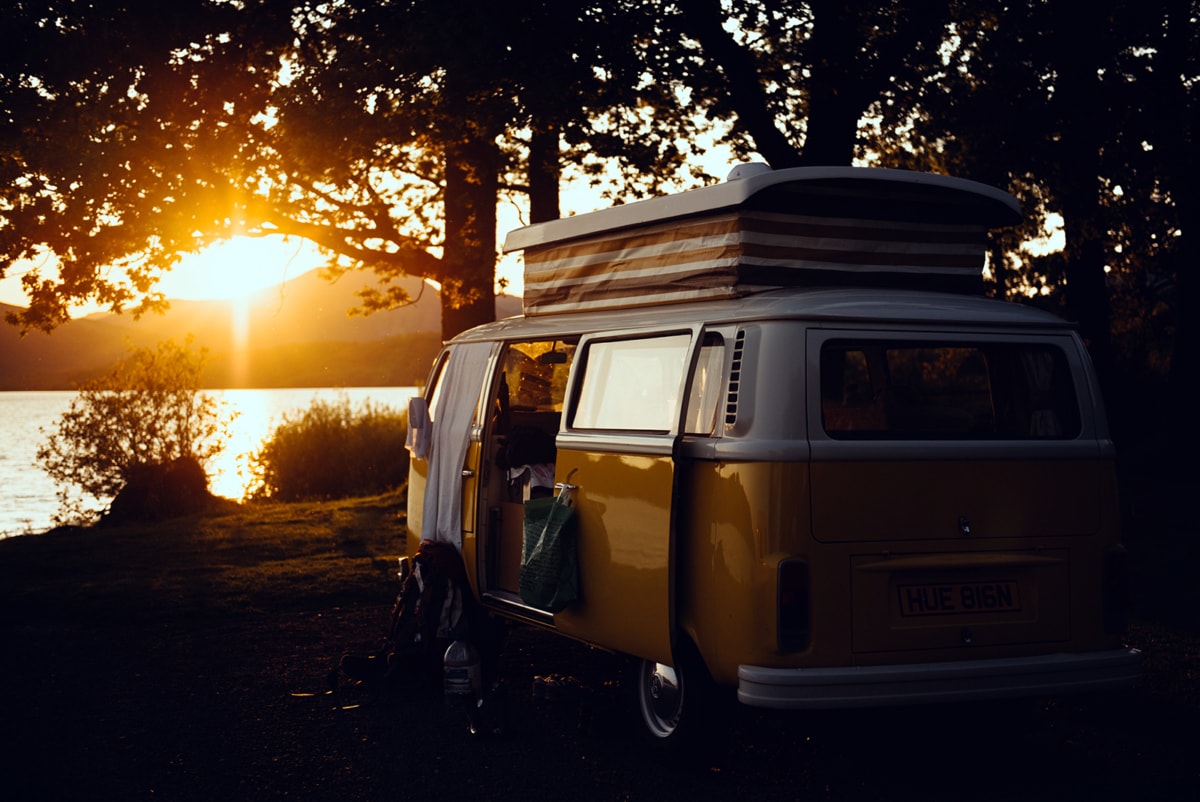

I like how you mentioned that you could stay in a motorhome or recreational vehicle while you’re traveling to your destination. My brother is thinking of looking for a luxury RV rental service because he’s considering renting a motorhome to travel across the country in to celebrate his birthday. It seems like a good idea for my brother to think about his options before choosing a reputable place to rent an RV from so that he and his family can be properly accommodated on their travels.
I find it helpful that you mentioned that the cost of renting an RV would vary depending on the date and length of travel and the RV choice. My boyfriend and I plan to rent one soon and go on a two-week road trip. I’ll take note of this advice and do our research to find the best RV to rent that fits our budget. Thanks!